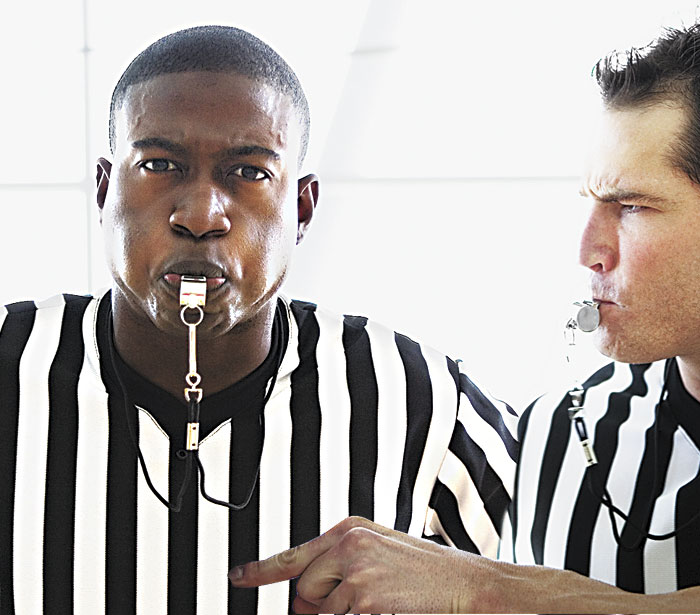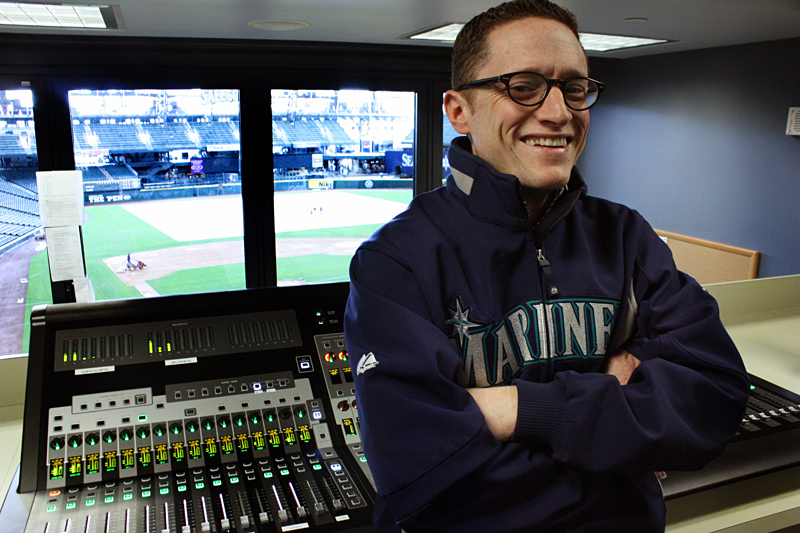Basketball followers are accustomed to referees being the subject of fans’ grievances. But they’re less accustomed to hearing referees air grievances themselves.
“The fraternity of officials is very quiet, kind of like the Freemasons. That’s by design,” says Ike Durham, a business relationship manager with Wells Fargo who has been a college basketball referee for more than 20 years. (Generally speaking, only pro refs are afforded the luxury of officiating full time without holding down a day job.)
Nevertheless, Durham and recently retired official Don Tuggle felt the need to speak up. They contend that for a long time, the Great Northwest Athletic Conference, an NCAA Division II league containing Seattle Pacific University and Western Washington University, hasn’t given black officials a fair shake. They paint a picture of a good-ol’-boys network in which white friends of current officials are hired and promoted over more qualified black applicants. And if Durham and Tuggle’s depiction is accurate, professional whistleblowers don’t like metaphorical ones: They say their decision to speak up has brought retaliation.
“You could look at the percentage of refs that [the GNAC] had. We did the math, and it was 5 percent people of color,” says Jody DeCuire, vice president of the Seattle/King County NAACP.
After Durham and Tuggle alerted the NAACP to the situation, the organization contacted the GNAC in May 2007. “We looked at their process for hiring, and realized they didn’t have any process to ensure they were being objective,” says DeCuire. “We told them, ‘It’s not that you have an overtly discriminatory process, you have no process at all. As a result you end up with a homogeneous environment.'”
Shortly thereafter, GNAC commissioner Richard Hannan flew to Seattle from his office in Spokane to meet with DeCuire, Durham, and Tuggle. As the group began discussions over the next several weeks on how to address concerns, the league’s supervisor of officials, Bob Olsen, moved to Florida. (Olsen, who has retired from officiating, says that under his tenure the percentage of refs of color increased, and he never hired on the basis of “friendship, race, color, or creed.”) Hannan replaced him with Stu Gorski, a veteran GNAC ref who pledged to be aggressive in ensuring opportunities for refs of color.
“In a normal year, you hire three or four officials,” says Gorski, who also sought to make employment decisions more meritocratic and transparent. “I made a point of going out and watching as many officials as I could, and I hired 12. I wanted to make sure that if there were people that believed that there was a good-ol’-boy system, that would be dispelled.”
Gorski notes that seven of the 12 new officials are people of color. “I didn’t go out there with a quota,” he explains. “I just wanted to find the best officials, regardless of race or background, and I think I did.”
But Tuggle and Durham note that the league declined to retain several black officials. Vince Elmore, who is black, says that Gorski declined to rehire him because he chose to attend his mother’s funeral in South Carolina rather than attend a basketball camp at which his officiating skills could be evaluated.
“What appalled me is that they knew what I was doing. I told them I couldn’t make it,” says Elmore, who is a lieutenant with the Portland, Ore., Police Department. “Do you really think I would put down my family to go to a basketball camp?”
Gorski denies that Elmore’s failure to attend the camp was the reason he wasn’t asked back. “That’s a pretty cold, heartless individual [who would require camp attendance over a family funeral],” Gorski adds. “I have said…repeatedly, there is no official GNAC camp. There is no mandatory camp—zero.”
Yet in a July 30, 2008 e-mail to Elmore, Gorski wrote the following: “Due to the fact that your ratings were very low (due much in part to this last year being your first year in the GNAC), and more importantly, in your inability to attend an instructional camp where I was in attendance (BCC, SPU, TCC, CWU, and WWU), this summer leaves me little choice [but to decline to ask you back].”
While Gorski is reluctant to speak ill of his predecessor, it is apparent that many of the complaints he faces originated in Olsen’s tenure. Gorski is adamant about the voluntary attendance policy of the camps in part because of accusations that Olsen required aspiring officials to audition at instructional summer camps from which he profited.
“Bob Olsen picked up on what a lot of the Division I assigners are doing to make a ton of money,” says a recently retired Division I official who asked to remain anonymous. “It wasn’t illegal, but it wasn’t kosher.”
“People would pay $500 just to learn they weren’t going to get the opportunity to work,” says Tuggle.
Olsen denies any profit motive. “People were observed at a variety of camps. There was only one that I operated. There’s a popular myth that these are big money-makers. The largest profit I ever turned was less than $1,000 for a three-day camp, with double and triple the number of days on either end for setup and cleanup.”
Gorski says he won’t “take one nickel” for a basketball camp. “I believe that it compromises me as a supervisor to hold a camp and take a profit from those who want to be officials,” he says.
He explains Elmore’s departure from the league by pointing to a system that he claims is designed to increase accountability and impartiality. “It had nothing to do with camps and everything to do with ratings,” Gorski says. However, when reminded of his seemingly contradictory July 30 e-mail to Elmore, Gorski adds, “It’s a catch-22. We tried very hard to find areas in which Vince Elmore could get additional training. The ratings indicated he wasn’t up to Division II standards.”
In the GNAC rating system, every official in every game is evaluated by the two coaches and the two other officials working with him. Prior to his tenure, Gorski says, the system was used haphazardly and not made transparent to officials. Nowadays he makes the ratings known to each official.
“It’s the correct and professional thing to do,” he says. “Schools and coaches demand the best officials, and this helps us provide that.”
But the ratings system only codifies the old cronyism, argues Durham, who believes that he and those associated with him have received poor ratings from officials who were beneficiaries of the old way of doing things. “We told them this was going to happen,” Durham recalls. As a result of the ratings, says Durham, “I went from about 17, 18 games to three regular-season games [and] 2 preseason games.”
Adds Tuggle, who officiated in the Pac-10 as well as the GNAC and recently retired because of chronic injuries, “If I would’ve come back healthy, he probably would’ve given me four games.”
Gorski concedes that some officials may be more likely to get the benefit of the doubt when rated by their peers. “If you’ve got a person who has served the association well [for] eight or 10 years, and they have a bad year, maybe you cut them some slack,” he says. “With a new official, maybe not.”
Bob Holloway is a veteran Big Sky football and basketball official who is African-American. He says Gorski has made a significant effort to ensure fair hiring practices.
“I’m a person of color and I have not seen this organization as a good-ol’-boys system,” says Holloway, who has informally aided Gorski in the talent evaluation process. “They definitely have gone more than out of their way to observe officials [of color], and they have talked to myself and others to ask, ‘If it is perceived as a problem, what do they need to do to correct it?'”
Holloway adds that officials who want to succeed can. “There are a lot of variables,” he says. “You’ve got to be in the right place, the right time. It depends on who’s hiring, who’s leaving…But if you are a good official and you stick with it, you’ll make it. It may take three or five years, but you’ll make it.”
Meanwhile, the NAACP says it wants objective criteria and increased transparency in hiring. “You need to base it on, fundamentally, ‘I’m looking for these skills, these levels of experience, these qualifications,'” says DeCuire. “Then if you need to get subjective feedback, you have that down on paper somewhere that’s auditable. Otherwise, you can never look back and say, ‘How did I get here?'”
Gorski says he’s pushing forward, attending as many games as possible to monitor current GNAC officials and scout potential new ones. Noting the frustration of Elmore, who continues to work NAIA games (a lower collegiate rung than the NCAA), he says, “I’ll go watch him work. I’ll go down to Portland.”







